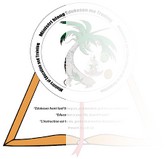
Quality Management System
A quality management system (QMS) is defined as a formalized system that documents policies, procedures, processes, and responsibilities for achieving quality in all services.
The QMS helps coordinate and direct an organizationís activities to meet client and regulatory requirements and improve its effectiveness and efficiency on a continuous basis.
The VITE Quality Management System is an important part of VITE's commitment to ensuring quality by continuously improving its services.
This VITE QMS has been designed to cover the requirements of a registered training provider, (i) the conditions of registration (Vanuatu Qualifications Authority (VQA) Act of 2014, Part 4 Section 28),
and (ii) the standards of registration (Vanuatu Qualifications Authority Framework of 2017, Part 7B).
The VITE QMS has 12 Policies, with their accompanying procedures and tools (or forms). These policies show VITE's committment to ensuring quality of service in all these different areas. The policy statements for each of the 12 VITE QMS policies are stated below:
POL-02 Management
VITE has a well-defined organisational structure with clear accountabilities. Leadership and Management at VITE is characterised by:
- strategic and annual planning that is in line with government goals;
- effective implementation of internal policies and procedures;
- maintenance of clear job descriptions with objectives and goals for all staff, and terms of reference for all working committees;
- effective risk and asset management;
- sound complaints management;
- an effective leadership;
- effective internal and external communication;
- effective engagement of relevant stakeholders;
- sound records management; and
- sound administrative systems.
POL-03 Program Design
A good program design and development consist of:
- adequate stakeholder involvement;
- program outcomes that meet the graduate profile;
- program duration that reflects the program credit profile, and
- assessment methods that align with program learning outcomes.
POL-04 Program Delivery
Program delivery at VITE meets the needs of learners through:
- a well-developed delivery plan that enables achievement of the course outcomes;
- a well-developed assessment plan and tools;
- well prepared, varied and innovative teaching methods and modes, including work-based learning, that engage all learners;
- well organized, conducive, inclusive and safe learning environment;
- highly qualified and experienced lecturer/trainers, assessors and moderators to deliver the course;
- being enjoyable and learner friendly, and
- appropriate equipment and teaching and learning resources.
POL-05 Finance Management
Financial management at VITE is of consistently high quality. This means it:
- is open and transparent;
- has a proper student fees payment and refund process;
- has proper financial recording and reporting processes;
- has a financial annual and longer-term planning system that involves wider consultation with relevant stakeholders and is informed by current and future course requirements;
- includes regular internal and external financial audits; and
- is compliant with international financial accounting standard.
POL-06 Human Resource Mangement
Human resource management includes:
- effective and transparent recruitment processes of staff, to ensure that all VITE staff;
- are sufficiently qualified and skilled for quality performance in their assigned position;
- meet the minimum requirements set by VQA (if applicable to the position);
- have a good professional, moral, and ethical profile;
- effective and well supported continual professional development of all staff;
- effective communication with staff;
- clear and effective succession planning;/li>
- clear and effective succession planning;
- an effective staff code of conduct and disciplinary courses of actions; and
- an effective, appropriate and inclusive incentive system for rewarding staff.
POL-07 Learner Support
Quality learner information and support services are accessible, inclusive, friendly and safe. They include:
- accurate and sufficient information for learners to make informed decisions about the institution;
- clear information of all courses offered;
- clear and effective application and recruitment processes;
- people with relevant and current knowledge and skills to provide the support; and
- all services that are relevant and appropriate for the learners in the institution.
POL-08 Resource Management
The physical and learning resources that support the delivery of education and training courses is of consistently high quality. This means that:
- the physical environment is inclusive, relevant, safe, secure, friendly, and supports holistic (physical, emotional, spiritual) development of learners (ref. POL-13 Health and Safety Policy);
- the learning materials and resources and appropriate in terms of them being inclusive, safe, accessible, current, relevant and adequate to meet the delivery of the courses;
- the institute is adequately and appropriately equipped with up-to date technology, equipment, ICT resources and facilities;
- there is an appropriate and effective management system established to manage assets and ensure sustainability of resources; and
- the institute has facilities and resources that are adequate and relevant for all staff to do quality work.
POL-09 Assessment and Moderation
All assessments within the scope of this policy are of consistently high quality. This means that:
- all assessments meet the principles of currency, fairness, feasibility, flexibility, reliability, transparency, sufficiency and validity;
- evidence used to make judgements about learner performance is accurate, valid, current, sufficient and authentic;
- all assessments, except RPL assessments, are internally pre- and post-moderated in accordance with the PSET Assessment and Moderation Guidelines;
- all RPL assessments are internally post-moderated;
- before or at the beginning of the delivery of a course/unit, all learners are given information about the assessment process, the context and purpose of the assessment tasks, the assessment criteria or marking schedule, the procedures for re-assessment and how to appeal an assessment result;
- before enrolment in a program, the processes and practices for the recognition of prior learning and opportunities for cross credit are communicated openly and clearly to all stakeholders (e.g. applicants, potential applicants, those who advise and guide them, education and training staff and assessors);
- learners receive feedback on their assessment results;
- learners are assessed at enrolment to determine their LLN level and support is provided to those that fall below minimum required LLN standards;
- all assessments comply with the assessment specifications and requirements in the approved and current course/unit of competency documentation, and
- assessors and moderators meet the minimum requirements as set out in the national PSET Assessment Policy, the Assessment Moderation for PSET Policy.
POL-10 Learner Achievement
Learner achievement:
- data are kept confidential, and can only be accessed by learners and approved stakeholders;
- data are accurate;
- data are retained and reported in accordance with national and legal requirements;
- data are holistic and include academic as well as behavior/character records and results;
- data are validated by the accrediting agency, if required, and
- is appropriately celebrated.
POL-11 Research
Good research at VITE includes:
- a culture of research that offers a climate of academic freedom which includes freedom of inquiry and the right to disseminate the results thereof, freedom to challenge conventional thought, freedom from institutional censorship, and the privilege to conduct research on human and animal subjects;
- quality monitoring of all research activities conducted at VITE to ensure research is informed by the principles of honesty, integrity, trust, and accountability. It also ensures that it meets scientific and ethical standards, and that it is conducted with honest and thoughtful inquiry, rigorous analysis and accountability for the use of professional standards;
- systems that ensure all courses that are developed and delivered by VITE are updated and informed by the results and findings of trustworthy research, and address the needs of VITE as well as national needs, and
- research support, in terms of funding support, partnership with other institutions, supervisions support, attending and presenting at international conferences, professional development in relation to research, research publication, subscription to international publications, etc. The general principle governing the allocation of all research funding in VITE is that it is an investment intended to maximise the range of outcomes that VITE expects to result from staff research.
POL-12 Continuous Improvement
All operations at VITE are internally monitored at least once within a four-year period. All operations are internally reviewed every five years.
All internal monitoring and review activities are systematic, fair, open and transparent, evidence-based, standards-based, feasible and manageable, and confidential.
Monitoring and review outcomes are used to improve operations.
POL-13 Health and Safety
VITE shall ensure that adequate resources, measures and best practices are in place to provide a friendly, user-friendly, inclusive, safe, healthy and hazard-free learning and working environment for all learners, staff, visitors and the campus community.
Important Legistlations

VITE Legistlations and Plans.
Here is the list of VITE legistlations and plans:
- VITE Act of 2001
- VITE Stategic Plan
- VITE Annual Plan
- VITE Calendar.

MoET and TSC Legistlations.
Here is the list of MoET and TSC legistlations:
- Education Act No.9 of 2014
- Teaching Service Act No.38 of 2013
- PSET Policy
- National Language Policy
- National Inclusive Policy
- Language Policy

VQA Legistlations.
Here is the list of VQA legistlations:
- VQA Act of 2014
- VQAF of 2017
- VQF of 2017
- PSET Provider Registration Procedures
- PSET Course Accreditation Procedures

NUV Legistlations.
Here is the list of NUV legistlations:
- NUV Act No.34 of 2019






